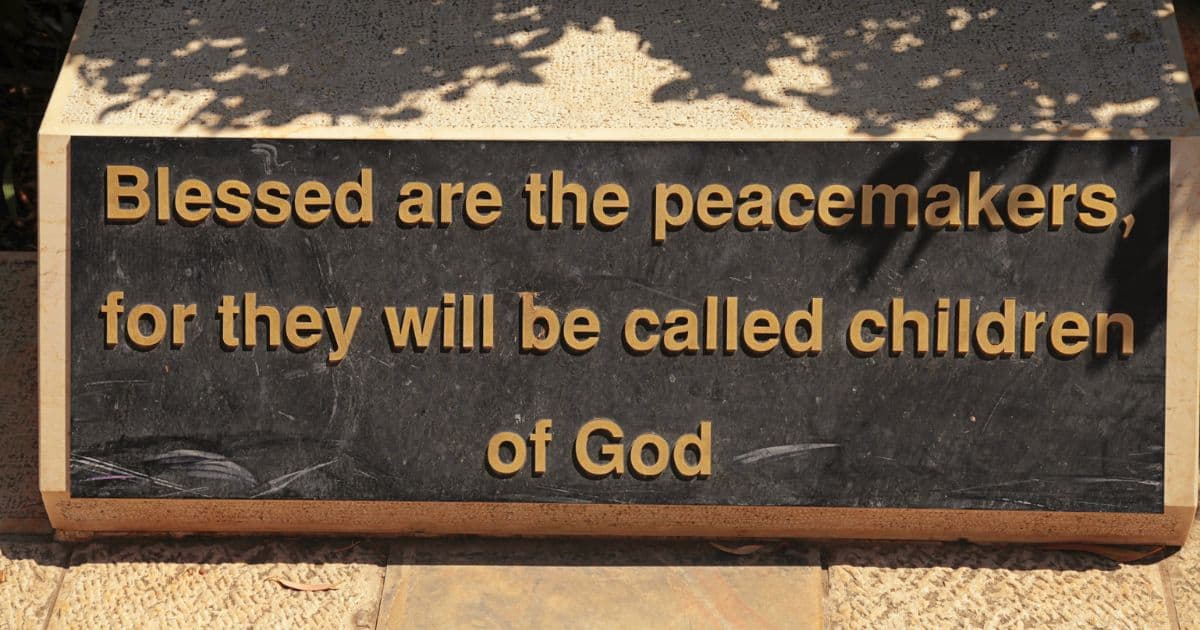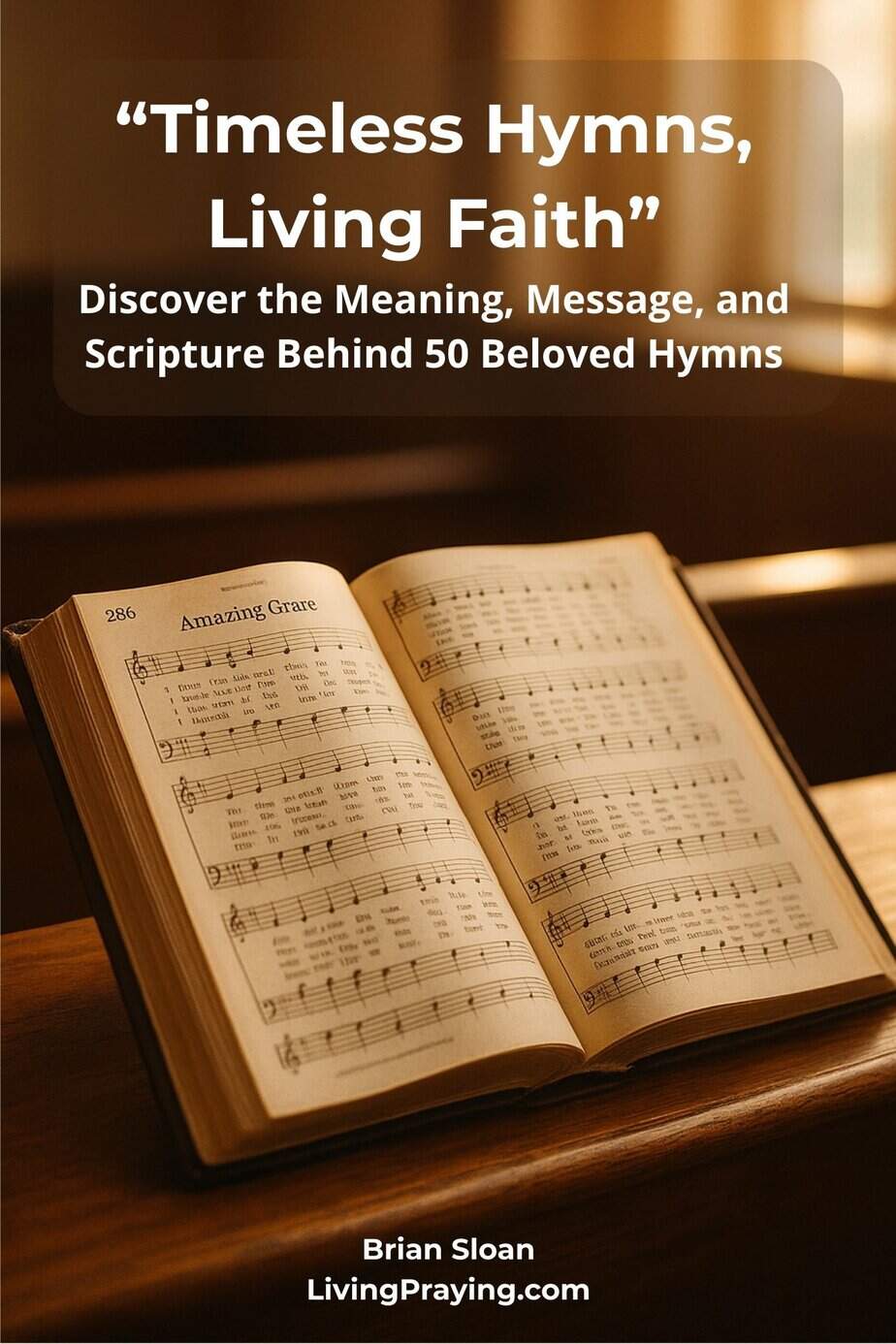Discovering The Meaning Of The 8 Beatitudes
The 8 Beatitudes are among some of the most famous teachings of Jesus. What is the meaning of the 8 beatitudes? Why did Jesus teach them? And what is the context in which they appear?
In this article, we will explore each of the beatitudes and see how they apply to us. Many people misinterpret these teachings, but when you understand their true meaning, they can be incredibly powerful. Stay tuned as we take a closer look at each one!

The Beatitudes are “blessings” laid out in the Book of Matthew Chapter 5. We see Jesus teaching on a hillside near Capernaum. By this time enormous crowds were following Him and were listening to His teachings. He was quite the talk of the town, loved by some, and despised by others.
This Sermon on The Mount is quite possibly a compilation of teaching that took place over several days. The 8 beatitudes are often called “The Blessings” as Jesus laid out 8 attitudes or actions that were pleasing to God, and how the person could be blessed by that.
If you hang on for a few paragraphs, we will see the other shoe (or the other sandal) drop, as we say – certainly not in a sinful way from the Holy One. However, in a way that a large percentage of Christians fail to understand. The meaning of the 8 Beatitudes will spring to life differently by the end of the chapter.
Many sermons and Bible studies have been done about the “Sermon On The Mount” by Jesus. It is quite an extraordinary passage of Scripture. Jesus begins the chapter by giving comforting words to the humble, and the merciful, and He gives other descriptions of those who might have the characteristics of a Godly person or follower of Jesus Christ to those who might need it.
First, let’s take a look at each one of “the Beatitudes” individually. It would take volumes to go through the meaning of the 8 beatitudes in detail, so we will briefly touch on each one. They start in the Gospel of Matthew, chapter 3. In this example, for a more traditional rendering, we will use the NIV version, which is certainly accurate.
Let me be careful to state this. The Beatitudes were beautiful words of truth spoken out of the heart of the Messiah, Jesus Christ. However, the means or methods by which those listeners could participate in those characteristics of holiness and their blessings would drastically change when the New Covenant came into effect after the resurrection of Jesus.
Jesus was introducing something that would change everything! When we understand what Jesus was actually doing in these passages it will help us in desiring to worship Him more!
Beatitude # 1
“Blessed are the poor in spirit, for theirs is the kingdom of heaven.”
Matthew 5:3
You will find that various theologians and commentators will identify “poor in spirit” in ways that differ slightly. It can be interpreted as understanding their own spiritual helpless own their own with deep humility. The state of poor in spirit might well contrast with self-sufficiency that someone might find through worldly deeds or success.
However, the poor in spirit are aware of their spiritual poverty. There are examples of people throughout the biblical narrative who understood that they were spiritually weak in their own power. However, they had faith that God was truly God and that He was in control.
Acknowledging who He is and surrendering your heart and life to His control will certainly bring you into the kingdom of Heaven.
Beatitude # 2
“Blessed are those who mourn, for they will be comforted.”
Matthew 5:4
On the surface, I might apply this to myself since I lost my dear mother last year. However, this verse seems to be quite a bit deeper and broader than the comfort of someone because they have lost a loved one.
Is God, the Holy Spirit – the ultimate comforter for Christians who have lost loved ones? Certainly.
However, this 2nd beatitude seems to indicate that this mourning is a sorrow coming from the state of our personal acknowledgment and sorrow for our sins. Look at this staggering verse that the Apostle, Paul wrote to the church in Corinth:
“For the kind of sorrow God wants us to experience leads us away from sin and results in salvation. There’s no regret for that kind of sorrow. But worldly sorrow, which lacks repentance, results in spiritual death.”
2 Corinthians 7:10
So, does that mean that God wouldn’t or didn’t comfort my family in the loss of my mother, or the physical loss of any of our loved ones? No. However, the intent of the verse just seems to go much deeper than that. The meaning of the 8 Beatitudes goes much farther than we may see at first.
However, it’s also interpreted as referring to those who mourn or are sorrowful at a deeper spiritual level for their sins. It can include sorrow or recognition of how much humanity itself had fallen short of God’s commandments, which Jesus himself would soon fulfill.

Beatitude # 3
“Blessed are the meek, for they will inherit the earth.”
Matthew 5:5
You will also see various interpretations of the word “meek.” So, let’s quickly hit the high spots. A meek person is someone who may endure hardship, persecution, or simply being made fun of without lashing back in uncontrolled anger.
They have the ability to patiently wait on God. This doesn’t mean that they must let someone abuse them or make a doormat of them. It just means that they possess a degree of spiritual calmness and control.
This verse is almost identical to one in Psalm 37 in the Old Testament which says,
“But the meek will inherit the land and enjoy peace and prosperity.”
Psalm 37:11
Notice how, in both verses, the meek will inherit the earth or land. God will reward followers of Him for being meek. But, how does that meekness occur? By obeying the commandments? No.
Stay with us. We have some exciting stuff ahead!
But first, we have 5 more of the 8 Beatitudes to go.
Beatitude # 4
“Blessed are those who hunger and thirst for righteousness, for they will be filled.”
Matthew 5:6
Here we find Jesus referring to those who have a deep desire and longing for the things of God, for the “things pertaining to life and Godliness” (2nd Peter 1:3). These people know and recognize that something is missing in their hearts and souls.
The conclusion here is that they not only have a desire for those things but they come to Jesus to be filled with all that they need. This happens as a person receives the resurrected Christ as their Lord and trusts Him for their life and salvation.
Beatitude # 5
“Blessed are the merciful, for they will be shown mercy.” Matthew 5:7
Many wise pastors and teachers have taught along the lines of these thoughts; “To become a person who is merciful, God may allow you to go through much brokenness.” I agree with the principle found in that sentiment. Sometimes God can’t teach us to give mercy in a great way until he allows us to deal with pain ourselves.
I wouldn’t go as far as to say that God can’t grant the gift of mercy to someone who hasn’t experienced “great hardship.” He can do what He wants to. And – mercy is actually one of the spiritual gifts found in Romans 12. So, only God knows to whom He will grant the gift of mercy.
Whatever the case, if someone shows mercy through the power of the Holy Spirit, which means they are “in Christ,” then one day they too will be shown mercy even though it may be in heaven.

Beatitude # 6
“Blessed are the pure in heart, for they will see God.”
Matthew 5:8
First of all, in beatitude # 6 let’s point out what Jesus did NOT say. He didn’t say blessed are those who are pure in their actions, or the way that they behave externally. Everyone knows that each of us can fall into the trap of doing something good, but out of bad motives. We can do good with a heart that is not sincere about the action.
So, Jesus is much more concerned about what’s under the hood rather than how shiny your paint job is. He wants us to be truly and completely clean, holy, spiritually-minded, lovers of God, and lovers of people. But, how do we get that way? By keeping the ten commandments perfectly? Nope. So how? We will see in just a bit.
Beatitude # 7
“Blessed are the peacemakers, for they will be called children of God.”
Matthew 5:9
A “peacemaker” is someone who works toward reconciliation between people and God and with people and each other. Peacemakers will take the initiative to be involved in disagreements and conflicts and have the desire to restore and mend those relationships with parties at odds with each other.
Those who are genuine, life-changing peacemakers through the power of the Holy Spirit will definitely be known as children of God in the now and the hereafter.

Beatitude # 8
“Blessed are those who are persecuted because of righteousness, for theirs is the kingdom of heaven.“
5:10
Then Jesus continues in this light,
“Blessed are you when people insult you, persecute you, and falsely say all kinds of evil against you because of me. Rejoice and be glad, because great is your reward in heaven, for in the same way, they persecuted the prophets who were before you.
5:11-12
We might be thinking that we’re not really being persecuted for righteousness’ sake. If we look at more oppressed countries where Christians worship God at the risk of being imprisoned or losing their lives, our small bits of persecution don’t even compare in terms of severity.
However, the Apostle Paul told Timothy, “In fact, everyone who wants to live a godly life in Christ Jesus will be persecuted.” So, if you are standing firmly on your beliefs you will receive at least a small degree of persecution from those who do not believe in the God or principles of scripture that you hold onto. However, even though you can be frustrated with persecution and be angry and not sin, it’s good just to come to the point where we don’t let insults bother us as much.
But, at whatever level of persecution, we know that a true born-again follower of Jesus Christ will inherit life in the perfection of the kingdom of heaven. Praise the Lord!
Things Are About To Drastically Change
Ok, we’ve gone through the Beatitudes, admittedly not deeply like you might in a long-term Bible study or a course in a Bible College or seminary. The Beatitudes are beautiful, wonderful, and true. The only problem is how anyone can live up to those things that Jesus spoke of in the Beatitudes.
Well, the big problem is, that by living according to and by the Law, even the best of persons are not capable of being made righteous by keeping the Law.

The Meaning of The 8 Beatitudes and The Fulfillment of the Law
Just a few verses after Jesus gave us the teaching of the Beatitudes he made a statement that many, still today, have debates about exactly what it means. However, it is actually quite simple but very, very profound and world-changing!
Here are those remarkable words from the Son of God:
“Don’t misunderstand why I have come. I did not come to abolish the law of Moses or the writings of the prophets. No, I came to accomplish their purpose. I tell you the truth, until heaven and earth disappear, not even the smallest detail of God’s law will disappear until its purpose is achieved.”
Matthew 5:17-18
Jesus is plainly stating that He is not doing away with the spirit of the Law. He does have a desire for us to live Godly lives and to do works that will glorify Him and serve others well. He doesn’t want us to murder or covet. He wants us to not murder, not commit adultery, honor our father and mother, etc.
However, Jesus is foretelling that His death, burial, and resurrection will fulfill the law in every capacity and provide forgiveness for our sins. He would provide an avenue for us to clothe ourselves in the total righteousness of Jesus Christ and receive the indwelling of the Holy Spirit through what He did on the cross.
The Jewish people in that day couldn’t fathom what He was saying there. It was going to be such a seismic shift in their lives that it was hardly even thinkable. But it was true.
Jesus had come to embody the Word. He was the living Word of God and he was to accomplish all that the prophets had written about and checked off every box of the Law for everyone who will put their trust in Him.
In other words, Jesus’ purpose was to establish the Word, embody it, and fully accomplish all that was written.
“Christ is the culmination of the law so that there may be righteousness for everyone who believes.”
Romans 10:4
The righteous and holy standards of the Law of Moses would be completely and perfectly fulfilled and the rigid requirements strictly obeyed by the Messiah. Plus, the ceremonial law and observances would be fully satisfied. What a God we have!
The Unfortunate Interpretation of Matthew 5
This brings us to a topic that is controversial to some religious people. The interpretation of much of Matthew chapter 5 is sometimes taught in a way that seems to be opposing what Jesus was trying to do.
If we do not look closely at the context and consistent Biblical texts that point to this time in Jewish history we will miss something of eternal significance in this chapter.
You’ve Heard This…But I Say This…
Here comes the most controversial part of this interpretation of Matthew 5. From verse 21 to verse 48, Jesus seemingly gives them a list of things to do that seemed even more stringent than what they might have believed about the law.
He says – you have heard this, but I say this. You have heard to do this, but actually, the standard is higher. What?
He consistently raises the bar of righteous performance for humans as he continues deeper into his sermon.
Let’s take a quick look at a couple of examples. In verse 27, Jesus said, “You have heard that it was said, ‘You shall not commit adultery.” Surely they knew that from the Law, but He makes the stakes higher by saying, “But I tell you that anyone who looks at a woman lustfully has already committed adultery with her in his heart.”
Ok, so now we don’t even have to get near another person to commit adultery? That probably didn’t seem like good news. The spirit of the Law is crushing!
Or how about cutting off body parts because of our sin? Have you seen a Christ-follower do that lately? Look in verses 29-30.
“If your right eye causes you to stumble, gouge it out and throw it away. It is better for you to lose one part of your body than for your whole body to be thrown into hell. And if your right hand causes you to stumble, cut it off and throw it away. It is better for you to lose one part of your body than for your whole body to go into hell.”
Matthew 5:29
Ok, if you have a problem with lust and can’t get those wondering eyes under control, grab the knife and cut your eye out because that’s better than being in hellfire.
Oh, wow – I think many of them could have been in a panic at this point of Jesus’ sermon unless they understood His ultimate purpose.
Well, how about someone who gets a divorce?
“You have heard the law that says, ‘A man can divorce his wife by merely giving her a written notice of divorce.’ But I say that a man who divorces his wife, unless she has been unfaithful, causes her to commit adultery. And anyone who marries a divorced woman also commits adultery.”
Matthew 5:31-32
Wow, he’s making the law harder than they thought. How could they ever live up to this?
(When you have some time read all of those things in Matthew 5 Jesus takes the standard up to a higher level).
He takes the moral standard up to a level that a man or woman would think that they wouldn’t have any chance of perfectly obeying or fulfilling Jesus’ instructions.
The Cherry “Bomb” On the Cake
Okay, Jesus is teaching his heart out. I don’t know what the posture or mindset of these followers would have been, but I think I would have been in shock and scared to death. I would be so afraid that there was no chance for me to live the Christian life as Jesus wanted.
In the power of our human abilities, we are simply a wreck when it comes to pleasing God. So, if the light of the meaning of the 8 Beatitudes, what could Jesus possibly be doing here?

Be Perfect…Did He Say That???
Jesus goes on to explain that not only should you not hate your enemy, but you must love them and pray for the people who persecute you. Plus, if you only love those that love you what good does that do? He said even pagans do that.
So, for at least the last 48 verses Jesus has intentionally piled the Law on them – making it look harder and harder to please God. He has the people riveted to their seats, rocks, or sand and probably many are trembling as he builds to this crescendo.
Whether it was loud or soft, the message rang out with the voice of a mighty God. Words that you would not have expected after the lovely phrases of the 8 Beatitudes.
“BE PERFECT, THEREFORE, AS YOUR FATHER IN HEAVEN IS PERFECT.”
Matthew 5:48
Can you hear the people in the crowd? “What was that?” “What did He say?” “I must have not heard that correctly.” “Honey, where’s my hearing aid?”
It was a staggering statement. How can we be perfect? How is that possible? Why, Jesus? Why would you say that?
Jesus Was Demonstrating the They Had No Chance At Law Keeping
I hope I don’t, but if I see a woman tomorrow and start having problems with lust, am I going to gouge my eye out? No.
He said those things to demonstrate the utter fallacy in people trying to keep the Law as a means of their righteousness. He was ushering in a whole new way of being righteous by dying for their sins and fulfilling the law.
The new way had to do with us having the righteousness of Jesus Christ that he imparted to us through the Holy Spirit as a result of Jesus’ death and resurrection.
They had to be ready to receive that. He wanted them to see that there was no other way.
Who can be perfect?? Only God. So, we are made partakers in God’s perfection and He applies Jesus’ perfect sacrifice to those who will trust in Him in order that they will someday enter the perfection of Heaven.
One Final Note: The Mistake That We Make In Interpretation
This is a topic I intend to write about more in the future. Many times the middle and latter part of Matthew 5 is taught as a Christian discipleship passage. It’s taught as a list of things to do and not to do in order to be right with God.
However, it is just not accurate. Why would Jesus tell those poor Jewish people that they should be perfect when He was the only perfect person to ever walk the earth?
He wasn’t preaching heresy. He got down to the guts – the spirit of the Law. However, he did so because He was about to usher in the New Covenant in which the law would be fulfilled. If they (or we) continue to try to gain righteousness or good standing with God through our good works or behavior, then we will fail. Righteousness can’t be attained by our works. Jesus was setting them up for the Gospel – salvation by grace through faith!
That doesn’t give us a license to murder, steal, hate our neighbor, or any other sin.
However, His death and resurrection freed us from the Law of sin and death. We no longer live by the law, but according to the Spirit. if we listen, the Spirit of God will lead us into paths of righteousness, love, and joy, that we could never imagine.
The 8 Beatitudes – In Conclusion
I hope this has encouraged or helped you with the meaning of the 8 beatitudes and, even more so, the context of Matthew 5. Maybe you didn’t think we would be in those Beatitudes and turn a corner as we did. We didn’t know that Jesus was about to put the hammer down and show the people their utter inability to keep the law. However, He did so in order that they would realize their need for a Savior.
The Beatitudes are beautiful, wonderful, and true. And, in spite of the statement above, Jesus ultimately didn’t put the hammer down on us. He provided a way out from under that hammer! Thank you, Jesus!
If we can help you in any way please contact us. Praise be to God.
For other pages about Bible Verses click here.







Leave a Reply